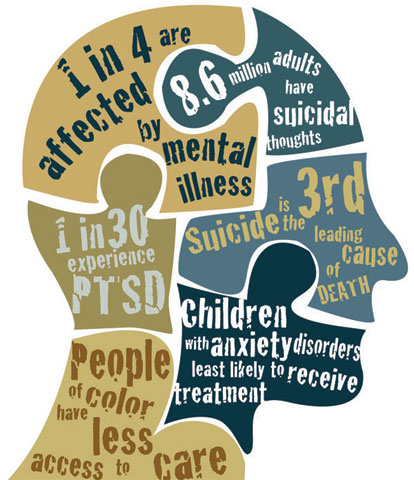Why Talking About Mental Illness Freaks People Out
Advertisements Help, But People Make It Work
“Shine a light on mental illness!” some advertisements scream out. “Erase the stigma.”
Well, now. Advertisements such as these are all well and good, and some good has come from them. People are becoming more aware of mental illness and discussing it more openly, but the hard truth is when you bring it up, not everyone welcomes the discussion with open arms.
Some bring it up because they feel a need to just air it and move on with their day. Others may not really have a full blown logic behind bringing it up – there’s no plan, really – but they feel it needs to be discussed in order that everyone has a clear understanding of what that person might be going through. Regardless of the intent behind bringing it up, what’s important is that the person who brought it up has a reason to do so and, like it or not, has determined that you are the person who needs to listen.
Some Important Stats

Fear
Fear can be a powerful motivator for not doing something. As the person who is listening to the other person talk about whatever mental health illness or problem they want to talk about, it may be that you instantly feel that you just aren’t ready to hear about it. It may be that you don’t feel qualified to listen.
So what do you do?
It’s hard to know exactly what the right thing to do in any given moment is. Not everything we hear is going to be pleasant and comfortable, either. If this person is someone you know well and trust, it’s easier to “suck it up” and just listen, making the appropriate gestures and sounds to let the person know that you’re there and that you have their back.
However, when you don’t know the person quite as well, it can be truly difficult to know how to be there for the person. Fear may kick in even more so, simply because you don’t know the person as you might a best friend. Letting fear prevent you from being supportive of someone who wants to discuss their mental health issue with you can be an easy way out, but the person with mental health challenges may feel further shut out.
A Cloud Of Stigma

Why?
Having a mental illness can be incredibly isolating. You have a tendency to look at everyone else through slightly different colored lenses, where you might think that no one understands you or what you might be going through. When you have a mental illness, you might be inclined to keep it hidden so everyone thinks you’re just like them. People tend to feel ill at ease when someone responds to certain events far differently than they would; the response that can occur is part of what has led to a reluctance to actually be open about mental illness.
Keep in mind mental illness is a very broad term; the term “illness,” in some respects, implies germs, fever, and something you might catch from someone else. This is far from the case. While some might argue that there is a genetic or hereditary component to some mental illnesses – and there are, in some cases – you can’t “catch” a mental illness from someone.
Also, mental illness can cover a broad spectrum, from depression to anxiety to schizo-affective disorder. Panic attacks might be a part of a mental illness, or it might not be. It’s really important to realize that having a mental illness does not mean that you are incapacitated.
Our Fear Of Mental Illness
Need To Know
Having a mental illness can be scary, to be sure. When you are first diagnosed with a mental illness, whether it is bipolar disorder or anxiety or something else, you might feel like you are truly going crazy, but the truth is, you’ve just started on a path that will teach you much about yourself and how to manage life’s obstacles as you go through life.
Your first inclination might be to try and behave as though nothing in your life has changed, but your understanding of yourself will have very definitely changed. As a result, you might feel as though people are looking at you differently than they did previously, but the truth is, people tend to be very self-involved as a general rule, and unless they know you extremely well, will likely not even notice that something is different about you.
You need to know that the people who are actually comfortable with you and know who the real you is will still support you and care about you. You need to continue to care about yourself in the process, and in talking about who you are, on any level, you break some of the stigma associated with mental illness. It doesn’t make everyone suddenly open to talking about mental illness, but self-acceptance of your own mental illness can be a healthy place to start.








